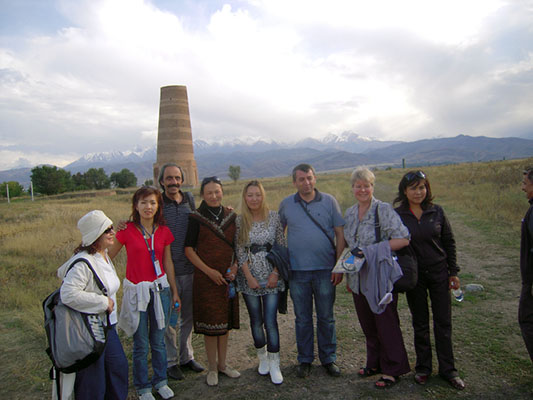Globalization and the Turkic World

November 29, 2010
It was with great excitement (and some trepidation) that I embarked on a 29-hour journey from South Africa to attend the Third World Congress of Turkic Sociologists held in Bishkek, Kyrgyzstan, 21-24 September. Not only were had there been reports in the newspapers about ethnic violence between the Uzbeks and Kyrgyz in the South of Kyrgyzstan, and bride kidnappings, but I also did not have a visa – just a letter from the organizers that my visa was waiting for me at Manas International Airport. However, it was plain sailing from the moment I arrived at the airport, with the organizers making every effort to ensure the successful participation of all delegates in the congress. I never felt unsafe during my visit and enjoyed every moment of it.
The congress was hosted by the Center for Turkic Civilization Studies at Kyrgyz-Turkish Manas University. The General Secretaries of the Organizing Committee were Prof Dr Ilhan Sahin, the Dean of Sociology at the university, and Prof Dr Kusein Isaev, the President of the Kyrgyz Sociological Association. This association is one of the ISA’s youngest collective members, and one of only four of the 55 ISA collective members coming from this region. The others are the Azerbaijan Sociological Association, the Kazakhstan Sociological Association and the Turkish Social Science Association. The following countries were represented at the congress: Kyrgyzstan, Kazakhstan, Turkey, Russia, Azerbaijan, Kurdistan, Tajikistan, Tatarstan, Ukraine and Uzbekistan.
The speeches at the formal opening were followed by a concert of beautiful traditional dances and an enthralling rendition of a section from the heroic epic ‘Manas’, which consists of a collection of Kyrgyz myths, legends and fairy tales related to the heroic character of Manas. During the opening session I was given the opportunity to encourage the approximately 200 participants to become involved in the ISA, and I also provided brochures with information about ISA activities for collection at the registration desk.
The main theme of the congress was “Globalization and the Turkic World”, and about 200 papers were presented during 40 split sessions over the three days. The debates were very lively and it is clear that Sociology is standing strong in the region. I also appreciated the efforts made to ensure the involvement of young sociologists as they are the future of our discipline.
The main barrier to full participation by individual members from this region in the ISA is of course language difficulties. The main languages of the congress were Turkish and Russian, while some delegates spoke Kazakh or Kyrgyz. The two official languages of Kyrgyzstan are Russian (which everyone but those in the most remote locations apparently understands) and Kyrgyz (recently introduced as an official language). Unfortunately none of the four languages that I understand were of much value in that environment and I had to rely heavily on my excellent interpreter, Meerim Kinalieva, to be able to communicate. Her assistance was invaluable.
Following an invitation from Prof Galina Gorborukova from the American University of Central Asia (http://www.auca.kg/) fellow Executive Committee member Prof Nikita Pokrovsky, Nikita and I had an opportunity to talk to AUCA’s final-year sociology students about their research projects. I was very impressed by the students’ enthusiasm (and their command of English) which bodes well for the future of sociology in Kyrgyzstan.
A further highlight was an invitation by Professor Kusein Isaev to Nikita and me to attend a celebration at a family member’s house. It gave us an opportunity to experience Kyrgyz hospitality and to gain some insight into family life in Kyrgyzstan. It was an honour to be allowed to share in his family’s joyful festivities and to witness the strong family bonds.
In conclusion, I would like to thank the Center forTurkic Civilization Studies at the Kyrgyz-Turkish Manas University who hosted the congress for inviting me to take part in this important event. In particular I would like to thank my hosts, Professor Isaev and Professor Sahin, as well as my interpreter, Meerim Kinalieva, for their efforts to make my stay so enjoyable. I look forward to seeing a closer relationship develop between the ISA and the Turkic sociologists and their organizations. A meeting between the top management of Kyrgyz-Turkish Manas University and delegates from various countries clearly demonstrated their desire to explore various forms of cooperation.
Tina Uys, University of Johannesburg, South Africa, ISA Vice-President for National Associations





